Console
Upon logging in to the application, you are greeted to a screen resembling the following layout.(depicted in the figure below). This section aims to provide you with a quick walk through of the core components required to operationalize your trading and investment activities.
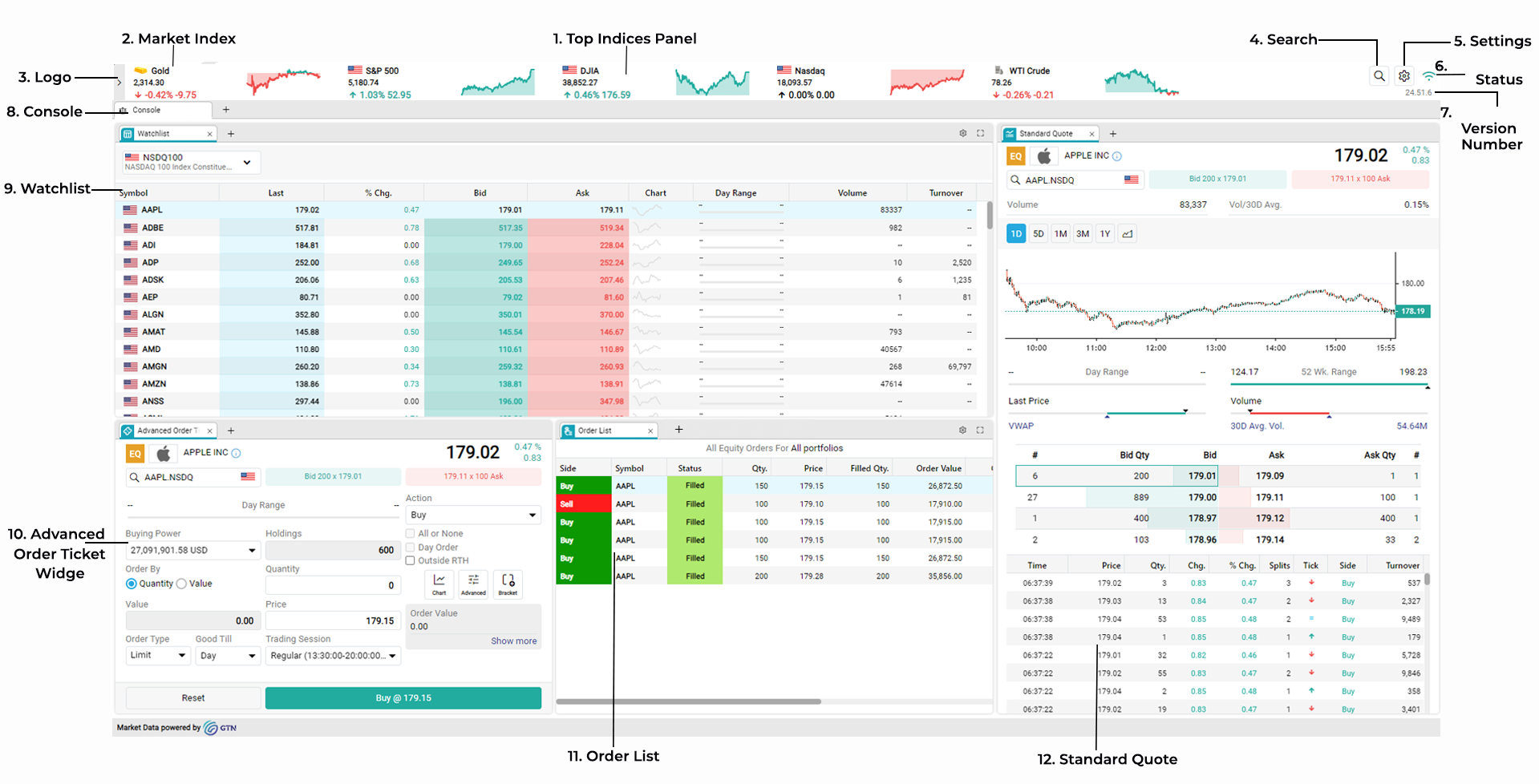
1. Top Panel
- A color-coded arrow will be displayed alongside each market index displayed on the top panel.
- A green arrow
 indicates that overall, the stocks contained within that market index are displaying an upward price movement/trend compared to the previous trading day.
indicates that overall, the stocks contained within that market index are displaying an upward price movement/trend compared to the previous trading day.
- A red arrow
 indicates that overall, the stocks contained within that market index are displaying a downward price movement/trend compared to the previous trading day.
indicates that overall, the stocks contained within that market index are displaying a downward price movement/trend compared to the previous trading day.
- Clicking on a 2D index chart (alongside a market index in the top panel) will open a full-scale chart view of the selected market index (depicted below).
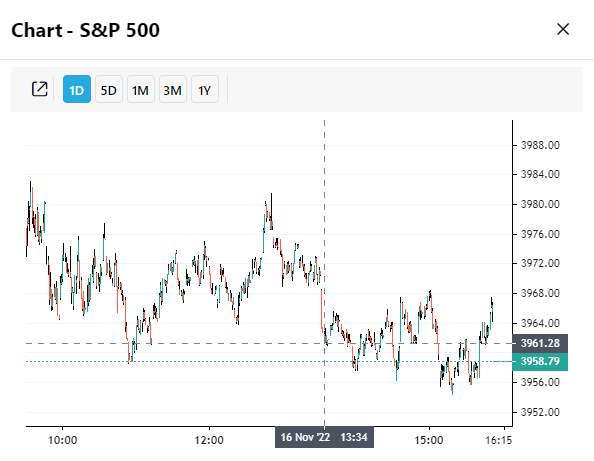
2. Market Indices

- Top panel displays a range of market indices available for the US Markets.
- The following US Market Indices will be displayed (by default):
- S&P 500
- The Dow Jones Industrial Average (DJIA)
- Nasdaq
- Crude Oil
- Gold
- BTC/USD
- Note: To view all the market indices, expand the top panel area by clicking the arrow
 button adjacent to the logo.
button adjacent to the logo.
- To change/customize the US market indices that are displayed on the top panel, simply move your mouse pointer towards the top right-hand corner of the top panel, then select the settings icon
 that appears upon mouseover.
that appears upon mouseover. - Alternatively, these can be also customized by navigating to the Settings page, clicking on Top Bar Index under the Display, and then adding the preferred indices under the 'US Top Panel Preferences' widget.
- Note: Apart from indices, you may also add commodities (i.e. Gold, Silver, etc.) to the US top panel index list.
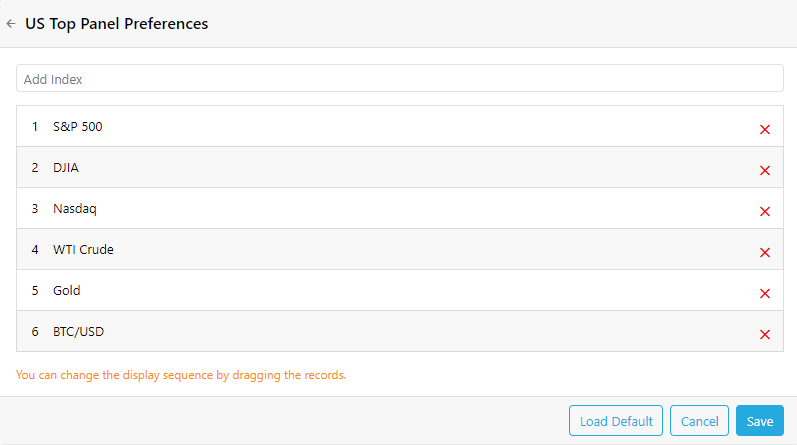
- Note: This feature is not available for Egypt and BHM-UAE customizations.
- To add an index or a commodity, simply type in the name of the index/commodity you wish to add in the 'Add Index' search field, then select it as it appears in the autocomplete list and press Save.
- A maximum of seven such indices or commodities can be added to the top panel.
- These seven indices can be rearranged in any sequence simply by dragging and dropping them to your preference.
- Clicking on "Load Default" will reset the list of indices to the above (pictured) list of default indices.
3. Logo
- Click on the arrow button to view the logo.
4. Search
- The application includes a powerful search function that lets you search for any symbol, index, currency, or financial security (options, futures, ETFs, etc.).
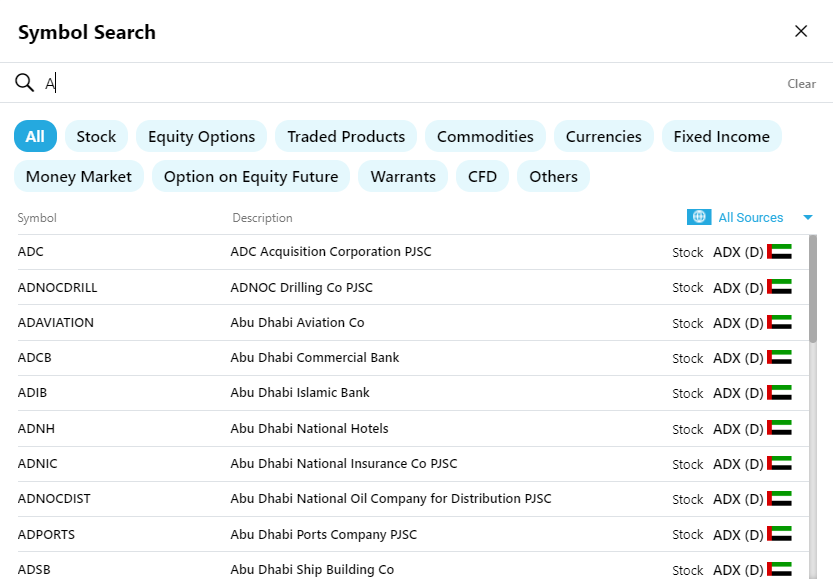
- Simply click on the search icon
 and start typing the name of stock/ security you wish to view, then select it from the relevant category when displayed in the autocomplete list.
and start typing the name of stock/ security you wish to view, then select it from the relevant category when displayed in the autocomplete list. - You can filter the search results by Stock, Equity Options, Traded Products, Commodities, Currencies, Fixed Income, Money Market, Option on Equity Future, Warrants, CFD.
- The search results can be filtered based on the exchange. Click on All Sources and select the desired exchange.
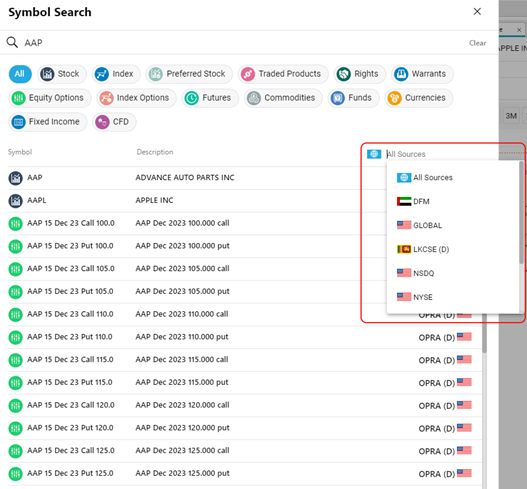
5. Settings
- Click on the icon to access the application's settings, which lets you customize the look and feel as well as the functionality of several components within the app.
6. Connection Status
- This
 icon displays your connection status to the trading application. This can be an 'Online', 'Partially Connected', or 'Offline' status.
icon displays your connection status to the trading application. This can be an 'Online', 'Partially Connected', or 'Offline' status.
7. Version number
- This refers to the application's version number. This is subject to change based on system updates.
8. Console
Console is comprised of watchlist, Advanced Order Ticket, Order List and Standard Quote. But it can be configured according to your preference by adding more widgets to the workspace by clicking the plus button or closing the existing one using the close button on top left side corner of each widget.
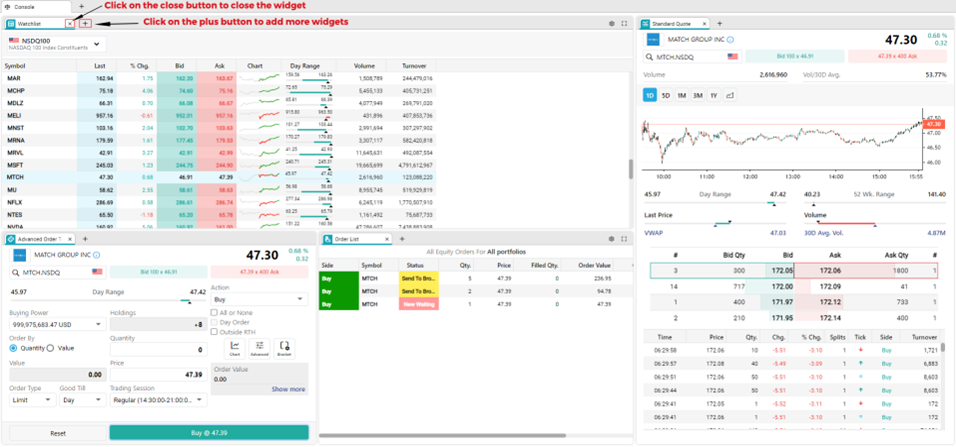
- By default, these widgets are linked to each other. Any change you make to one of the linked widgets will also be reflected in the other widgets that are linked to it.
- To turn off this feature, right-click on the widget you wish to unlink, and select off.
- To link the widgets, right-click on the widgets you wish to link, and select the same color for all the widgets you wish to be linked.
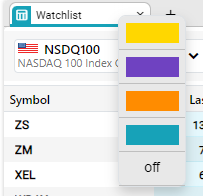
11. Watchlist
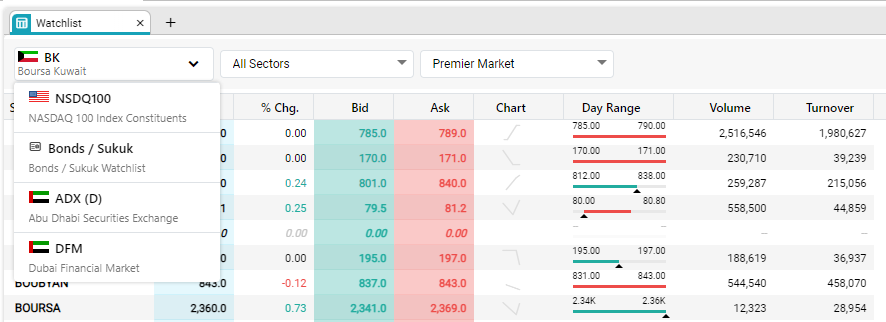
- The watchlist selector dropdown is located within the watchlist widget/ frame in the console and can be used to view the complete list of symbols in a particular market/ exchange (i.e. DFM, NYSE, etc.) or a user-created watchlist.
- Depending on your subscription the market feed can be a Real-time feed or a Delayed feed (this changes how fast information is updated). A delayed view is indicated by a "D" next to the market name in the market selector dropdown.
- Real-time: This refers to live (as it happens) updates from the exchange.
- Delayed: The trading events and updates to various fields (such as market time and sales, trades, and volume, etc.) are delayed by a predefined interval.
12. Advanced Order Ticket widget
- The order ticket serves as the core component through which you can buy / sell stocks using the application.
- Clicking on a symbol within the watchlist widget will automatically populate the order ticket widget with the symbol name, price, and other details enabling you to place a buy or sell-side order with ease.
- Selecting an option from the 'Action' dropdown (i.e. buy, sell, sell short, buy to cover), will change the color scheme of the order ticket, and update the relevant fields within it (i.e. Clicking on a symbol already purchased and selecting the 'Sell' action would automatically indicate the existing Holdings or quantity of the stock already available in the user's portfolio).
- Advanced Order Ticket widget provides you with Quick Information Panel, Chart, Advanced and Bracket order options.
13. Order List widget
- Using this widget, you can get a list of the orders placed within the day.
14. Standard Quote
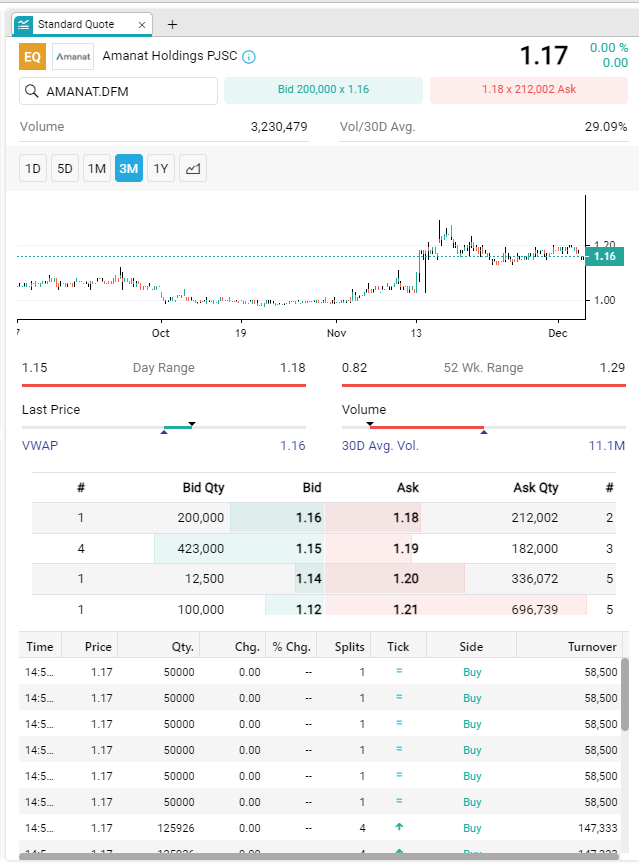
- A summarized stock profile including Market Depth and Time & Sales of the symbol that is selected will be displayed in this panel.
- You can select the symbol you wish to view by using the symbol search option at the top of the Standard Quote.

- Stock chart options within the stock summary widget:

Note: Refer to the section on Keyboard Shortcuts to learn more about accessing key features through shortcut keys.